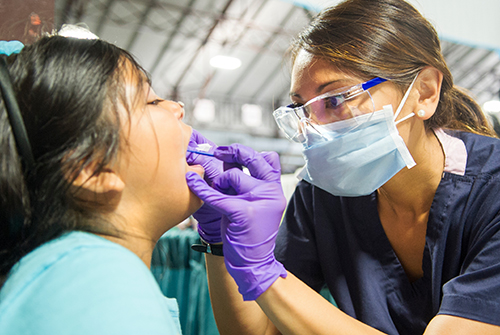A CURRICULUM-DRIVEN DESIGN
Health care in the United States has traditionally revolved around treating specific ailments as they emerge. But that mindset is gradually changing to one of “whole health”—a big picture way of thinking that involves looking not just at one health variable, but at all the variables that ultimately impact an individual’s well-being.
At the dental college, for instance, faculty members are teaching students to not only recommend a treatment plan for each patient, but to also do so with the input of the patient’s other health care providers.
Plans for the college’s new building mirror this modern mindset, Wolinsky said. In developing the space, planners were careful to fit the design to the curriculum—not the other way around.
Wolinsky explained that the current facility’s primary clinical space hasn’t seen an expansion for several decades. It is full of small operatories (treatment areas) that can accommodate only two to three people, and patients move from room to room based on the various dental specialists they need to see.
The new design, however, puts the patient’s whole health—and comfort—at the forefront. Large, open operatories accommodate not just the patient and a single practitioner, but rather the patient and their health care team. This means that a patient may be seen by two different dental specialists in one treatment area, or it might mean that the patient interacts with a dental specialist and a social worker, while a health care provider from a completely separate medical field provides input via virtual technology.
“In treating the whole patient rather than just looking at his or her individual oral health needs, students are focused on outcomes rather than just procedures,” Wolinsky said of this interprofessional, team-driven health care approach. “What we’re trying to create is an environment where dental students will learn that care needs to be considered and provided in a team setting.”
You can support the Texas A&M footprint and dental outreach in North Texas with a gift for the new Clinic and Education Building, which is slated for completion in December 2019. Naming opportunities begin at $25,000 and are available for areas such as operatories, classrooms and wings. Naming rights for the building are available for a $5 million gift, while other endowed gifts are needed to support dental students and faculty. To learn more, contact Melissa Odgen below.
ABOUT THE COLLEGE OF DENTISTRY
· The Texas A&M College of Dentistry was created in 1905 and was affiliated with Baylor University from 1918 to 1971.
· The school joined The Texas A&M University System in 1996, but retained its Baylor College of Dentistry name until 2016.
· Students from underrepresented minority groups make up 37 percent of the college’s student body, which closely reflects the state’s population.
· Along with seeing patients at the college, students treat thousands of area residents in community clinics, hospitals, nursing homes and jails under faculty supervision. They also present oral health education at local schools and offer oral screenings at health fairs.
